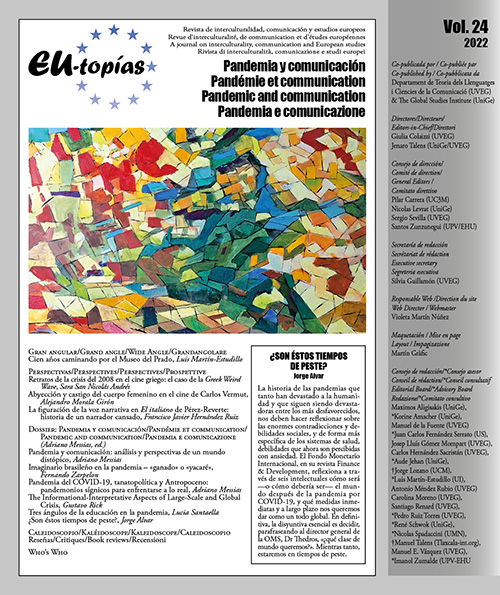The informational-interpretative aspects of large-scale and global crises
DOI:
https://doi.org/10.7203/eutopias.24.25271Keywords:
Communication, cultural adaptation, cognitive bias, misinformation, Anthropocene Abstract
Abstract
This paper discusses informational and interpretative aspects of large-scale crises like the COVID-19 pandemic and Climate Change. Laypeople might have difficulties interpreting information about «how a vaccine or the climate works» or «why a specific medication is safe and some particular research results are reliable» once this type of information requires some basic cognitive tools like statistical reasoning. This paper introduces the concept of adaptational lag to explain the general interpretative difficulties involved in abstract and scientific topics, which are basic in the modern complex world, particularly in large-scale crises. Statistics is a recent cultural cognitive development whose learning process in the individual mind is costly and, in many aspects, problematic due to cognitive bias and the automatic and intuitive mode of thinking. In comparative terms, the human mind is prewired to language. Humans are adapted on a genetic level to acquire language. From an adaptational perspective, statistical reasoning is a very different type of cognitive acquisition. In order to establish the concept of adaptational lag on some important contemporary scientific frameworks about the human mind, this article presents a brief comparative study of three cognitive acquisitions: (a) language, (b) written systems, (c) statistics and statistical reasoning. In the case of the human language faculty, the analysis is based on the theoretical framework developed by psychologist Michael Tomasello. In the case of the human capacity to write and read symbols, the analysis is based on the empirical and experimental work developed by neuroscientist Stanislas Dehaene. Finally, the analysis of the difficulties faced by the human mind in dealing with statistical reasoning is based on the «dual process theory» proposed by psychologists Daniel Kahneman and Amos Tversky. The present article argues that the major crises in the Anthropocene – the COVID-19 pandemic and the Climate Change are only two of them – will demand considerable reformation in the modern world epistemic institutions (universities, schools, and press media) to overcome the adaptational lag.
 Downloads
Downloads
 References
References
Dehaene, Stanislas. Reading in the Brain: the new science of how we read. USA: Penguin group, 2010.
Greene, Joshua. Moral Tribes: Emotion, Reason, and the Gap between Us and Them. New York: The Penguin Press, 2013.
Kahneman, Daniel. Thinking fast and slow. London: Penguin Books, 2011.
Kahneman, Daniel & Amos Tversky. Prospect Theory: An Analysis of Decision under Risk. Econometrica, 47(2), 263–291, 1979.
Laland, Kevin & Gillian Brown. Niche Construction, Human Behavior, and the Adaptive-Lag Hypothesis. Evolutionary Anthropology - EVOL ANTHROPOL. 15. 95-104, 2006.
Naiman, R. J., C. A. Johnston & J. C. Kelley. Alteration of North American Streams by Beaver. BioScience, 38(11), 753–762, 1988.
Odling-Smee, F. J. .«Niche constructing phenotypes». In Plotkin, H. C. (ed.). The Role of Behavior in Evolution. Cambridge (MA): MIT Press. pp. 73–132, 1988.
Pinker, Steven. The cognitive niche: coevolution of intelligence, sociality and language. Proc. Natl Acad. Sci. USA 107, 8993–8999, 2010.
Pinker, Steven. Rationality: What Is It, Why It Seems Scarce, Why It Matters. New York: Viking Press, 2021.
Tomasello, Michael. Constructing a language: A usage-based theory of language acquisition. Cambridge: Harvard University Press, 2003.
Tomasello, Michael. Origins of human communication. Cambridge, MA: MIT Press, 2008.
United Nations Educational, Scientific and Cultural Organization (UNESCO). Global education monitoring report 2019: Migration, displacement and education: Building bridges, not walls, 2018.
Downloads
Published
How to Cite
-
Abstract243
-
PDF88
Issue
Section
License
![]()
The authors conserve the copyright. All content published in EU-topías. Journal of interculturality, Communication, and European Studies are subject to the license Creative Commons Attribution-NonCommercial-ShareAlike 4.0 license. The full text of the license can be found at <http://creativecommons.org/licenses/by-nc-sa/4.0>
They may be copied, used, disseminated, transmitted and publicly displayed, provided that:
- The authorship and original source of the publication is cited (journal, publisher and URL of the work).
- They are not used for commercial purposes.
- The existence and specifications of this license of use are mentioned.
It is the responsibility of the authors to obtain the necessary permissions for images that are subject to copyright.



